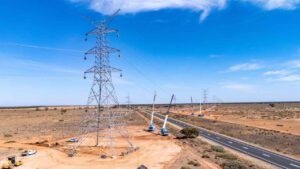Construction of a world-leading, concentrated solar power (CSP) tower plant that will supply electricity, heat and desalinated seawater to grow tomatoes in the Australian desert has been completed in South Australia.

At the end of what has been a tough week for renewables in the state, Sundrop Farms marked the completion of construction and the beginning of full operations at their world-first 20-hectare solar desalination farm in Port Augusta on Friday, with an official opening celebration.
The opening of the $200 million state-of-the-art solar thermal development is a fillip for Port Augusta, which last week took the brunt of 83km/h winds that accompanied the one-in-50-year storm that wreaked havoc in South Australia.
And the recent closure of the Port Augusta’s coal-fired power station – the state’s last in operation, that had been running since the 1960s – puts the region at the forefront of a major industrial and economic transformation.
The Sundrop tomato farm – which has generated jobs for around 175 people – is the first commercial scale facility of its calibre in the world, using sunlight and seawater to grow 15 million kg of truss tomatoes a year that will be sold exclusively through Coles supermarkets via a 10-year offtake agreement.
The greenhouses will also produce more than 450,000m3 of freshwater per year – equivalent to 180 Olympic size swimming pools – and displace the use of more than 2 million litres of diesel per year.
The technology was developed by Danish renewables outfit Aalborg, who began construction of the custom built concentrated solar power tower system – including a a 51,500m² solar field consisting of more than 23,000 heliostats – for Sundrop in October 2015. The 127 metre solar tower went up in March.
 Sundrop Farms managing director for Australia, Steve Marafiote, says the development provides a blue-print for the future of fresh food production.
Sundrop Farms managing director for Australia, Steve Marafiote, says the development provides a blue-print for the future of fresh food production.
“Through the establishment of our high-tech greenhouse facilities, we are driving solutions for the production of healthy food in a manner that eradicates the impacts of variability to ensure sufficient supply of produce in line with consumer expectations, and ultimately promote long-term viability of farming in regions facing water and energy supply constraints.”
SA Premier Jay Weatherill, who has spent much of the past week defending his government’s nation-leading approach to renewable energy development, said the project highlighted the state’s appetite for the commercialisation of world leading, innovative technology – and the jobs that accompany it.
“This state-of-the-art development is a massive boost for Port Augusta and the Upper Spencer Gulf, creating almost 200 jobs and heralding the start of an exciting new industry for the region,” he said on Friday.
“It also aligns with several of South Australia’s key economic priorities, including creating premium food and wine from our clean environment and growth through innovation.
“It is yet another example of a world-leading company making a long-term investment in this state and I look forward to seeing the wide-scale benefits the project will bring over coming years. The state government supported the project through a $6 million grant from the Major Projects Program of the Regional Development Fund.”
 The project was also supported by the Clean Energy Finance Corporation and $100 million of funding from leading global private equity investor KKR.
The project was also supported by the Clean Energy Finance Corporation and $100 million of funding from leading global private equity investor KKR.
Sundrop Farms founder and CEO, Philipp Saumweber, said the Port Augusta development demonstrates the company’s unique agribusiness model that benefits people, planet and long-term, sustainable profits.
“Today is exciting because we’re really opening what is a world’s first facility and one that has … pioneered decoupling food production from finite resources,” Saumweber said.
“But the work for Sundrop isn’t finished, it’s just starting,” he added. “Here in Australia, we have a long-term commitment to R&D and innovation and are looking to build future projects in this state and around the country.
“It’s a business that provides green jobs, high-tech growing jobs, that provides training for local and regional communities and that provides research and development opportunities right here in Port Augusta.
“A crucial element to our success is our people and their multi-disciplinary capabilities, across agriculture, engineering, food production, renewable energy, and finance which have contributed to what is a paradigm shift in food production. We’ve worked in consort to achieve lasting and sustainable advances in horticulture utilising abundant and renewable resources,” Saumweber said.







